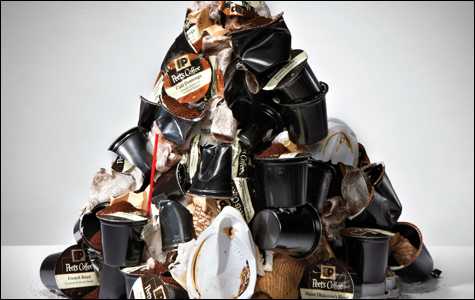The pods and their environmental impact went under the spotlight last week in Canada as a Progressive Conservative politician in Ontario introduced a private member’s bill that would, if passed, make it illegal to sell the products unless they are fully compostable. Retailers would get four years to take non-compostable pods off the market.
“It’s the best solution for the environment,” the Parry Sound-Muskoka MPP told Kelly Cutrara in an interview on Thursday.
The province’s Liberal government has said it is open to reviewing Norm Miller’s proposed legislation, although private member’s bills seldom become law.
But despite the push for compostable versions of the product, some large municipal waste programs in Ontario say they have yet to approve eco-friendly coffee pods for their curbside composting programs.
“There is a difference between (being) laboratory-certified compostable and what municipal composting systems can achieve,” said Jim McKay, general manager of solid waste management services for the City of Toronto.
City staff are testing the compatibility of coffee pods with their composting program and will report their findings in February next year, he said, but concerns about the ability of the system to handle the products remain.
Ottawa and Hamilton also do not accept compostable coffee pods in their curbside compost bin programs.
“The compostable coffee pods do not get completely decomposed during the duration of processing,” Hamilton spokeswoman Clorinda Pagliari explained.
“Hamilton’s (compost) facility is designed to process material for approximately 42 days. The pods do not decompose within this time frame and may present as contamination in the final product.”
The Association of Municipalities of Ontario has also raised concerns about processing compostable pods, saying the products may not consistently and adequately decompose in every municipal system.
Those who use the pods, however, do think about what happens to the products when they’re thrown out, said one industry analyst.
Canadians drink over five billion cups of coffee per year and the pods have become the most popular way to consume coffee at home, said Robert Carter, executive food service industry expert at the business analyst firm NPD Group.
“There’s a huge volume of these single-serve pods going through the system, and the number one concern that consumers have in using these pods is their environmental impact,” Carter said. “From an industry standpoint, (making them compostable) is the right thing to do.”
The biggest challenge, however, is getting city waste services to be able to adequately deal with the products, Carter said.
“With passing this type of legislation, hopefully that will force the municipalities to start to accept these items when they are made of compostable material within their (compost) programs.”










